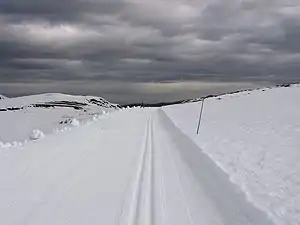Hautacam
Hautacam is a ski resort in the Pyrenees. It is situated in the Hautes-Pyrénées department, in the Midi-Pyrénées region. In road bicycle racing, the ascent to Hautacam is known as a tough climb, which is used occasionally in the Tour de France.
| Hautacam | |
|---|---|
.jpg.webp) The station in December 2010 | |
| Nearest major city | Argelès-Gazost |
| Coordinates | 42°58′20″N 0°00′29″W , |
| Top elevation | 1,800 m (5,900 ft) |
| Base elevation | 1,500 m (4,900 ft) |
| Website | Official website |

Cycle racing
Details of climb
Starting from Argelès-Gazost, the climb is 17.3 km (10.7 mi) long. Over this distance, the climb gains 1,170 m (3,840 ft) in altitude to the top of the climb at 1,635 m (5,364 ft), at an average gradient of 6.8%.[1]
The stage finishes of the Tour de France in 2008 and 2014 were at an altitude of 1,520 m (4,990 ft) and in previous races were at 1,560 m (5,120 ft).[2] The climb used by the Tour de France starts at Ayros-Arbouix, from where there is 13.6 km (8.5 mi) to the finish, climbing 1,164 m (3,819 ft), at an average gradient of 7.8%.[2]
Tour de France
Hautacam first held a Tour de France stage in 1994, won by Luc Leblanc. Since then, it has been used a further four times, including the final mountain stage of the 2014 race.[3]
Tour de France stage finishes
| Year | Stage | Start of stage | Distance (km) | Category of climb | Stage winner | Yellow jersey |
|---|---|---|---|---|---|---|
| 2014 | 18 | Pau | 145.5 | HC | ||
| 2008 | 10 | Pau | 156 | HC | ||
| 2000 | 10 | Dax | 205 | HC | ||
| 1996 | 16 | Agen | 199 | HC | ||
| 1994 | 11 | Cahors | 263.5 | HC | ||
It was on the climb to Hautacam that Lance Armstrong set up his victory in the 2000 Tour de France, until being disqualified for doping. In appalling weather, the race arrived at the first mountain stage, with Javier Otxoa the only survivor from an early break. On the final climb, Armstrong went off alone into the wind and rain leaving his challengers struggling, pushing Jan Ullrich into second place by four minutes. Once Armstrong had taken the Maillot Jaune, he was never seriously challenged until the end of the race.[4]
References
- "Hautacam - Argelès Gazost". climbbybike. Archived from the original on 10 July 2008. Retrieved 24 July 2014.
- "Lourdes-Hautacam dans le Tour de France" (in French). ledicodutour. Retrieved 24 July 2014.
- "Stage 18: Pau to Hautacam". Tour de France. Amaury Sport Organisation. Archived from the original on 28 July 2014. Retrieved 24 July 2014.
- Woodland, Les (2003). The Yellow Jersey Companion to the Tour de France. Yellow Jersey Press. p. 174. ISBN 0-224-06318-9.
External links
| Wikimedia Commons has media related to Hautacam. |